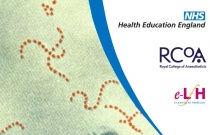Liver: Cirrhosis and NASH
Conor Corr and Mark Callaway and Muhammed Hanif and Huw Roach
0.50 Hours
This session will cover the imaging appearances of liver cirrhosis and non-alcoholic steato-hepatitis (NASH). The causes, significance and complications of these conditions will also be discussed.
Multiply Injured Child
John Sinclair
0.50 Hours
This session looks at the initial management and stabilization of the multiply injured child with reference to published trauma guidelines.
Disinfection
Sunil Garg
0.50 Hours
This session describes disinfection and its methods. These concepts are critical and fundamental to minimize the risk of cross infection within the healthcare sector.
Mathematical Modelling and Input-Output Principle (IOP)
Steven Cruickshank and Alison Schofield
0.50 Hours
This session examines some simple but important models of physiological systems.
Clinical Studies Part One: Cohort Studies and Measures of Association
Jason Walker
0.50 Hours
This session covers how cohort studies are designed, measures of association, relative risk and odds ratios.
Helping to Reduce Neonatal and Infant Death
Trixie McAree
0.50 Hours
This session explores current understanding of infant mortality and the health promotion approaches available to improve the neonatal and infant death rate.
Introduction to Psychosocial Management in Dermatology
Andrew Thompson and Kerry Montgomery
0.50 Hours
This session provides an introduction to psychodermatology. It provides background information on the types of psychosocial issues and forms of distress most commonly experienced by dermatology patients and seen in dermatology practice. It provides an overview of common forms of mental distress and how to assess for the presence....
Management of Common Specific Poisons
Fran O´Higgins
0.50 Hours
The purpose of this session is to introduce the specific management of the more common agents associated with poisoning.
Herpes Virus Infections in the Immunocompromised
Tim Wreghitt
0.50 Hours
Honourary Consultant Virologist. Dr Tim Wreghitt has a BSc from London University, a PhD from Surrey University and is a Fellow of the Royal College of Pathologists, where he is the treasurer and Vice President - elect. He has been in the Cambridge Regional Virus Laboratory for 31 years. He is currently the Regional Microbiolog....
Hepatitis C: Natural History, Presentation and Investigation
Sanjay Bhagani
0.50 Hours
This session describes the natural history and presentation of someone with both acute and chronic hepatitis C infection and the investigations required.
Intracranial Infections
Anna Shekhdar and Michael Perry
0.50 Hours
Intracranial infections (also called central nervous system infections or CNS infections) are relatively rare, but form a very important differential diagnosis in the unwell patient. It is essential to suspect and expedite treatment because consequences of a missed CNS infection are severe.
Necrotizing fasciitis
Pejman Davoudian FRCA EDIC FFICM and Neil J Flint FRCA EDIC
0.50 Hours
Necrotizing fasciitis (NF) is a progressive, fulminant bacterial infection of subcutaneous tissue that spreads rapidly through the fascial planes causing extensive tissue destruction. NF can affect any part of the body and is the most serious presentation of necrotizing soft tissue infection (NSTI); it is a rare but potentially....
Nosocomial Infections and Infection Control
Raj Nichani and Steve Knight
0.50 Hours
This session describes the commonly occurring nosocomial infections in critical care and the common sites of infection. A description of standard infection control practices, emphasizing the importance of adhering to these procedures, is provided.
Major trauma: assessment and initial management
The National Institute for Health and Care Excellence (NICE) industry specialists
0.50 Hours
This guideline provides guidance on the assessment and management of major trauma, including resuscitation following major blood loss associated with trauma.
Imaging: Coma
Mary Gawne-Cain
0.50 Hours
This session aims to provide you with a method of approaching the imaging of the undiagnosed unconscious patient. It briefly covers the initial clinical workup of an unconscious patient presenting to the emergency department (including use of the Glasgow Coma Scale). It describes a checklist to be used in the analysis of the com....
Nasal Anatomy
Michelle Leemans, Katherine Cheesmen and Ian Calder
0.50 Hours
This session focuses on the anatomy of the nose. It will also explore complications of nasal instrumentation, the functions of the nose, and its vascular and nerve supply.
Cold Injury
Elizabeth Wharton
0.50 Hours
This session will describe the pathology of cold injury and explain how to differentiate between frostbite, chilblains and trench foot. Later sections will describe the systemic effects of hypothermia.
Forensic Aspects of Burns
Elizabeth Chipp, Niall Martin and David Barnes
0.50 Hours
This session will explain why a burn injury may become part of a forensic investigation and explore the types of forensic evidence that a burns expert may be asked to provide in court.
Monitoring the Patient with a Major Burn
Nick Pantelides and David Barnes
0.50 Hours
This session describes the clinical measurements and devices that can be used to monitor the resuscitation of patients with burns.
Comfort Care for Patients with Non-Survivable Burns
John Gibson and Sarah Hemington-Gorse
0.50 Hours
This session will identify the factors that determine which burns are non-survivable and describe how to deliver appropriate palliative care for patients with such injuries.
General Surgery: Gastrointestinal Haemorrhage Lower
Hannah Knight
0.50 Hours
This session will describe the approach to the patient with suspected lower gastrointestinal haemorrhage including immediate management, investigation, aetiology and definitive treatment.
Genitourinary Disease: Lower Urinary Tract Symptoms
Ashwin Sridhar and Senthil Nathan
0.25 Hours
This session outlines the assessment and management of lower urinary tract symptoms in men. The session takes the reader through the relevant anatomy, pathophysiology, and definitions of terminology, assessment and management.
Genitourinary Disease: Renal Failure
Madeline Moore
This session will give you an overview of renal failure, including how to categorise renal failure, urological causes and how to investigate and manage these.
Genitourinary Disease: Scrotal Swellings
Madeline Moore
0.50 Hours
This session will provide an overview of scrotal swellings including how to differentiate between different scrotal pathologies, identifying and instigating basic investigations and management for important conditions including testicular torsion and testicular cancer.
























